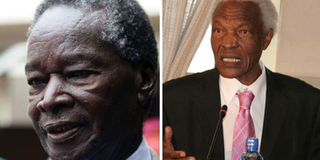Biwott, Kiplagat and the shame of hanging onto public office

Nicholas Biwott (left) and Bethuel Kiplagat. Both are deceased. A less obvious reason for Biwott’s and Kiplagat’s longevity in public office is the shamelessness of Kenya’s leadership elite in general. PHOTOS | NATION MEDIA GROUP
What you need to know:
- In the Moi-era dictatorship, other than Moi himself, Biwott’s name literally evoked terror.
- Kiplagat found himself with questions to answer over Robert Ouko’s assassination.
If you were a first-time visitor to Kenya this past week you would hardly tell that Kenya had lost some of the worst men to ever hold public office anywhere in the world.
From acres of newspaper coverage to glowing eulogies at grand funeral ceremonies in church and high-profile mourners at the burials, Nicholas Biwott and Bethuel Kiplagat got a send-off fit for national heroes.
TERROR
The only little embarrassment appeared to have been caused by the elements, which saw the hearse carrying Biwott’s body to its final resting place in rural Keiyo get stuck in mud.
Yet in life the two men embodied a very dark chapter of Kenya’s history.
Widely believed to have been the most influential figure in the Moi-era dictatorship, other than Moi himself, Biwott’s name literally evoked terror.
OUKO MURDER
He lived the last 27 of his 77 years on earth under a cloud of suspicion that he had a hand in the 1990 murder of Robert Ouko, then minister for foreign affairs and a Cabinet colleague of his.
His name tended to pop up in just about every inquiry into one of Kenya’s most high-profile political murders, made even more chilling by the subsequent deaths of a majority of the witnesses.
DEFAMATION
The Ouko murder saga, of course, counts among its victims the media, publishers and investigators hit with millions of shillings in damages by the courts for linking Biwott to the crime.
Kiplagat, the foreign affairs permanent secretary at the time of Ouko’s murder, found himself with questions to answer over his boss’s assassination as well.
MASSACRE
But it was perhaps his having been credibly linked to the 1984 Wagalla massacre in which security forces killed more than 3,000 ethnic Somalis in Wajir that earned him such public notoriety.
A stranger to Kenya’s public life might wonder how, with their wicked reputation, the two men continued to hold national leadership positions many years after their alleged involvement in those macabre incidents.
POLITICS
Biwott served as Cabinet minister and MP until 2007 when he lost his Keiyo South parliamentary seat, and remained active in national politics to his death as the chairman of the National Vision Party.
Kiplagat chaired the Truth, Justice and Reconciliation Commission, of all the institutions!
One could point to individual wealth and powerful connections to try to explain this absurdity.
SCANDAL
But a less obvious reason for Biwott’s and Kiplagat’s longevity in public office is the shamelessness of Kenya’s leadership elite in general.
The notion that public officials should not bring shame to the offices they hold or voluntarily quit to preserve the dignity of public office in case they are named in scandals is still alien to Kenya.
In other democracies, Biwott and Kiplagat would have disappeared from public life quietly, heads bowed in shame, the moment they were mentioned in the Ouko murder or Wagalla massacre inquiries.
[email protected] @otienootieno





